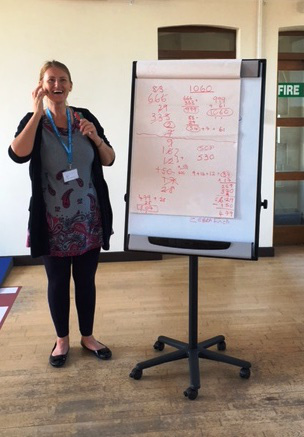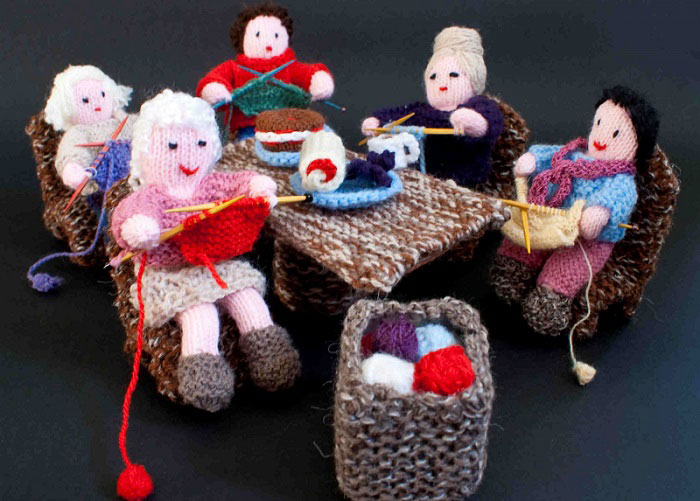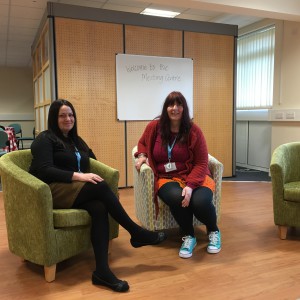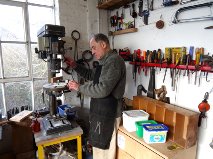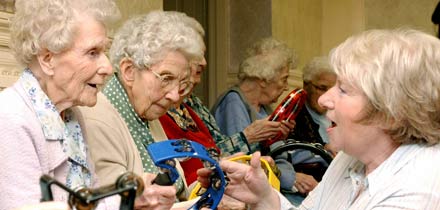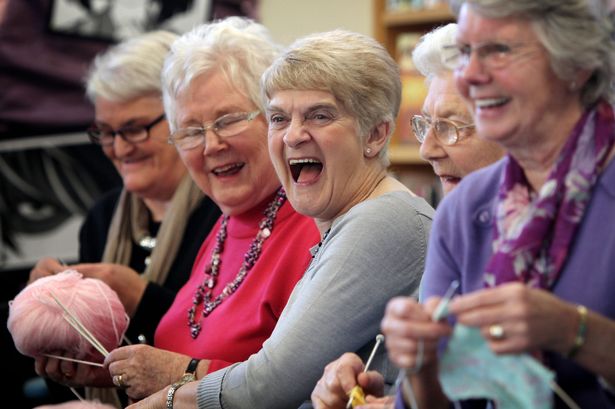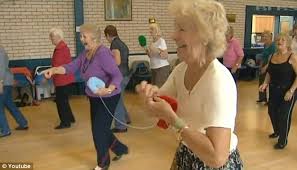- "DMC" is a lot more convenient A DMC is an up-to-date version of a daycare centre with important advantages. Carers leave their carees at the daycare centre in the morning and collect them in the afternoon without participation in the care process. According to caree ability to remember, carers may not know what happened during that time. There's a care-triangle of the caree, the carer and the Ross DMC as a cohesive and innovative way of dealing with the growing numbers of dementia sufferers.
- Depending on the capacity of their caree to remember what took place, combined with the level of cooperation of the daycare staff, the caree feedback can vary on the worth of a specific daycare centre.
- The purpose of DMCs is to improve on that situation. The huge difference between a daycare centre and a DMC is that carers participate in the wider aspects of the care process which is person-centred. One clear fact is that a significant proportion of people with dementia who attend DMCs regularly, experience delayed entry into residential care. The financial savings are obvious. The wider benefits to carees, their carers and to the families involved would double the length of this article. We will summarise them later.
- DMCs have been running in Holland for twenty years. That's where the "delayed entry into residential care" quote came from. There are only two DMCs in the UK so far (at Leominster and Droitwich) and there are less than half a dozen in progress. It will take a long time to reach the Dutch numbers of over 125. Such numbers can only be reached by local leaders and residents giving every encouragement. In our case in Ross, to this innovative Ross DMC project. One aspect of innovation is the speed at which it is being developed. Normally there is a slow procedure to recruit the right people, followed by several extensive meetings, which can take up to a year.
- The Ross DMC project has begun on the authority of Dr Simon Lennane at Alton Street Surgery who is the Mental Health lead on the Herefordshire Clinical Commissioning Group. [here and to extract anything useful] He is a member of the Ross Mental Health and Wellbeing Steering Group which meets at Christ Church in Eddie Cross Street. Put "Ross-on-Wye Dementia-Friendly Town" into Google and find nothing. The Group plans to change that. If all in Ross respond well to the Ross DMC, the job will be done. The Group can sort Google out.
- The project could not start without the support of Reverend Deborah Cornish at the URC. She has authorised and encouraged the project by kindly agreeing to host the Ross DMC. One of the highest hurdles other projects have had to jump is finding suitable premises.
- The project donkey-work is being carried out by Prof Alan F Harrison. He looks forward to project-based assistance from local residents and project-based financial etc assistance from local companies and other organisations. He and his wife go to the Leominster DMC once a week. Alan speaks with enthusiastic authority on the benefits of travelling for up to two hours. However, other Ross residents will not want to travel far to benefit from and enjoy what is, essentially a right to better local dementia care provision. Alan has been informal/family carer to his wife since 2000 and they have been Ross residents since 2004. Teresa was confirmed as having dementia in 2013 since when Alan has made a study of dementia and improving care provision.
- Any carer making a transfer from a conventional daycare centre to a DMC might assume that DMCs deal with personal care. It is Important to emphasise that no personal care can be carried out. This includes giving medication and use of the WC.
- So far, readers have also learned that within DMCs, carers participate in the dementia care provision and that carees benefit from delayed entry into residential care. The latter benefit is achieved by person-centred care. That's a big topic hardly capable of summary in a few words. Essentially, it is treating the person with dignity and respect: understanding their history, lifestyle, culture and preferences: and looking at situations from the point of view of the person and not a set of symptoms. The people in the care-triangle mentioned earlier all participate in the caree treatment on an equal level of interaction.
- .. .. Participation in the DMC care provision and process, then, is the key characteristic of the DMC. Note that the sentence didn't start with "Carer participation". Carees also are part and parcel of the "care-outwards" to other carees and carers and are not solely receivers of "care-inwards". You can imagine that "care-outwards" might be aimed at the specific carer as a subconscious thank you. As much as that may be valid, there is a positively-pervasive group care-outwards which reaches the parts that conventional daycare centres don't reach.
- Carers having collected their carees from conventional daycare centres might ask "What did you have for lunch today?" half expecting and receiving the reply "Don't remember". "I buttered a lot of rolls and then filled them with X and Y." is more likely within the Ross DMC situation. It's easy to see that "participation" is the key word. If an unpublished academic got hold of this, there would be a paper on "Differences between the active and passive lunch and their effect on caree wellbeing."!
- And that leads nicely back to the meal content. "Have you tried the ham and cheese sandwiches which Tom made?" "Or the broccoli quiche Janet and etc made." Pick and mix caree/carer Janet/Tom. Birthdays don't pass without celebration. Carers can bring the ingredients, candles etc and leave the rest to the group. The caree can be occupied elsewhere. If it's the carer's birthday, a family member can bring the components. Participation in the care activities results in greater understanding of the wider benefits to oneself as a carer, and those with dementia.
- Recreational and social activities, such as reading/discussing the newspaper, painting, singing, preparing lunch, shopping and other caree/carer-suggested activities
- Therapy, such as reminiscence, dance, music and movement. Retail therapy has been mentioned. Nail therapy and massage are added.
- Make Do and Mend. Bring in your mending and polishing. Recycle that broken thing-me-jig.
- A Harp (etc) demo and a chance to try it with a visiting musician. [perhaps use extracts from We're singing for the brain here which carries a link to other recycled songs]
- Take your turn Ceilidh with music supplied by members
- Knit and natter pic (1) or 18 - or - shed talk more
- Alan and his wife Teresa have made many friends at the Leominster DMC. He hopes the Ross DMC will combine with the Leominster DMC and vice versa half way between the towns. A gardens would be ideal and two Leominster visits were very successful.
- DMC-participating carers enjoy the carer-DMC relationship where carer needs, wants and views affecting them and their loved-ones have a clear influence on the nature and content of the caring and other aspects of what happens. They enjoy sharing the caring when, normally, it is a one-to-one activity. They enjoy the interaction within the normal activities, and occasional carer-group cohesion in the backroom together while their carees are busy and being looked after elsewhere.
- You recall "Participation in the DMC care provision and process, then, is the key characteristic of the DMC." Volunteers are a key part of the care provision and the supporting admin. The Ross DMC begins on a self-funding-project basis. Volunteers are not asked to donate anything but their time. Come and help set up a project where the carers pay a few £s per session on food which would otherwise be eaten elsewhere. Someone is needed to collect the money and processes it. More to the point, help the carees and carers get the best out of their one day a week. Spread the joy. The aim is the normal DMC three days a week before Christmas.
- You also recall "Normally there are numerous and extensive meetings to recruit the right people which can take up to a year." The Ross DMC project philosophy is run in pilot format for a few weeks and then show "the right people" who will look after the project via meetings and minutes etc. All in due course.
- Let's look at the first few weeks. Volunteers are needed to participate in the DMC care process. They will learn the broad principles within and ethos of an international project to increase the numbers of DMCs. A UK university is looking after the research aspects. Results will be published around March next year. A major charity has provided most of the UK money so far. The future of existing and in-pipeline DMCs can depend on those results. Ross DMC is free from such worrying constraints at the start and and hopes to find independent funding for its launch and while further funding is sought.
- The Ross DMC project philosophy is don't hang around dangling from the edge of a pound sign. We in Ross can raise enough initial finance and enthusiasm to operate on a one day a week basis. The Ross DMC can then ask for Herefordshire Council etc support and continue finding independent funding.
- A diagnosis of dementia can be frightening for those affected by the syndrome, their carers and other family members. Learning more about dementia can help. source Ross DMC carers can opt to participate in discussion based on sharing their problems and helping each other. Points of common concern can be identified and the appropriate expertise sought. The Alzheimer's Society is the main benefactor to the two DMCs up and running. A Dementia Advisor will be invited at the appropriate time. Other experts will follow.
- If it is decided by common consent when the Ross DMC is up and running to connect to the international DMC project, there will be formal meetings. Learning more about dementia is included and experts give talks. There will be public meetings to learn about Ross DMC at the end of its first month, and to learn about the international project on X and Y dates/times. being considered In the meantime, that well-known WW2 Army recruiting poster needs to be revamped to say "Ross DMC needs you."
- Given that there will be a body which decides how Ross DMC operates, the detail will be worked out. People will want to find out more before deciding to help. One way of doing things is to group interested parties which send one visitor, or established groups such as Ross Traders send one visitor. Ross DMC hopes that the Ross Gazette which has kindly given Ross DMC the limelight will come back, say once a quarter, to report progress.
- Come on in Ross residents, companies and organisations. The first level of help from residents is encouragement. Reminiscence therapy is well-used within DMCs and participants enjoy including their photos and memorabilia in the reminiscence sessions. Making the most of long-term memory contributes to overall wellbeing. Sharing memories is a major part of that. Musical instruments - nothing mouth-blown thanks. Participants can buy recorders for £2, if wanted. That mincer or washboard in the loft dating from 1940 etc, A Woodbines packet, empty OXO cube boxes, that string of pearls, Snakes & Ladders, Ludo, Happy Families, those vinyl records and long-since used CDs of old songs and music can be handed in at the St Michael's Hospice charity shop in Gloucester Road. Add working Meccano models etc, Dinky toys. You get the idea, don't you. Please don't give clothes in need of carbon dating. However, more-recent fancy dress will be enjoyed again.
pagetop
- Another level of help is participation as a volunteer. [Discussion with Christ Church in progress.]
- Money lubricates the wheels of the wagon. Personal donations via the St Michael's Hospice charity shop will be welcome. Companies and organisations may feel forever being asked for money. The Ross DMC welcomes that form of support but differs thereafter.
- Some statistics: the number of carers in 2011 was 5,430,016 [source 1/12] and 10% care for someone with dementia [ - 6/12 - ] 543,000. Around one in nine workers in the UK has caring responsibilities and there must be plenty of them in and around Ross. To them, we say this: use the Ross DMC and if you can't be there with your caree, ask a family member or friend. To the company directors, we say this: discuss the opportunities Ross DMC presents with your employee-carers with a view to mutual benefit. Happy employees demonstrate a happy company. They'll be even more happy with a cheque to present to Ross DMC !
- All companies and organisations are welcome to help. Money talks and there are other ways of helping. An accountant would be a good start. Within the first month, a look-in by a Health & Safety expert would be appreciated. Include looking at the equipment. A Personnel Officer could help set up the record system and advise as finance allows the project to take on paid staff. Once the Ross DMC Manager is appointed, all the experts can relax as members of the Steering Group or whatever name is decided.
- It won't be long before a formal management system involving committees is reached. We've looked at care volunteers and expert volunteers. A different type of volunteer is sought. Anyone aiming to improve dementia care services in their area would not expect to find all they need on one sheet of A4 or a small webpage. It is appropriate from the start to emphasise that there is plenty to be read and plenty of meetings. The Ross DMC needs community as well as professional support to keep going. With or without experience of involvement in any type of community project, your participation will be welcomed. "Meetings people" are needed but no matter if you aren't one. Enthusiasm and energy is more important than diplomas on an office wall. If you are a carer aiming to use the Ross DMC, or volunteer within any charity, you have much to offer.
- Nothing happens until enough people ask. Inform as many people as possible and ask them to ask for this new approach to local dementia care provision. Send emails. Put in requests to your GP, local councillors, Adult Wellbeing and other social services. If you are a carer, when Occupational Therapists and District Nurses etc arrive to see your caree, talk about the need for and benefits of Ross DMC. Whenever you are in conversation about healthcare, maximise the opportunity. It's all a matter of spreading the word while at the same time you are pushing.
pagetop
- An invitation is extended to carers with carees who are at the early or intermediate stage of dementia
- An invitation is extended to people who are at the early or intermediate stage of dementia who cope without a carer and/or who still drive and/or who are able to self-organise Dr Lennane to approve this text.
- To minimise parking problems, transport is hoped to be arranged via community transport, and RWVS or are they the same?
- Use of the term dementia does not rule out those who suffer from related mind ailments Dr Lennane to approve this text.
- An invitation is extended to the general public to attend a meeting on ....
- An invitation is extended to individuals/companies interested in supporting the project financially to attend a meeting on ...
- 38 and 40 are being considered which will affect text in C 13.
- See what's happening at DMCs via http://carerworld.yolasite.com/worcdemalldmc.php link to remain
- Roll up but don't turn up!
- The Ross DMC opens its doors at Christ Church (details) on Xday Y of Z month at 1100 to 1500. Carees and their carers who have made arrangements to attend will receive a warm welcome. Others who turn up without prior contact, it is regretted, can make an appointment to return for discussion on another day.
- Contact info
- Other concluding comment.
- New It is hoped that the Thursday discussion will look at Christ Church adopting the DMC project rather than the DMC project having to go through constituting, finding trustees, being quorate, becoming an employer etc. Please fund a Manager for eight hours per week. (Five hours on the day plus three hours admin.) The employees, ideally and eventually, would be paid by the CCG, which no doubt has other tasks in the Mental Health field, so would be employed by whichever org wins the contract to do all the MH work the CCG is commissioning. The DMC would be one project for this contract, I imagine.
- New However, PR A7 says this: "One aspect of innovation is the speed at which it is being developed. Normally there is a slow procedure to recruit the right people, followed by several extensive meetings, which can take up to a year." The CCG process would extend the year. The spirit of the PR is to be up and running without delay. Reduce the red tape by whatever means. Show the powers-that-be, and Ross community, what they are to fund rather than make applications for an outlined DMC. If Christ Church can take on the project, finance and all, if and when money comes from Govt sources, the position can be reviewed.
- New If the Ross DMC is taken on by Christ Church lock, stock and barrel, an extensive amount of constraint and hard labour is much reduced. Fewer applications and reports to make. It can decide if it wants to be shackled to the Univ of Worcester project. That alone needs a member of staff to deal with.
Christ Church
Edde Cross Street, Ross-on-Wye, HR9 7BZ
Host to the Ross Dementia Meeting Centre
in place at the top and not numbered
pending
if not host, all the numbers would need to be changed
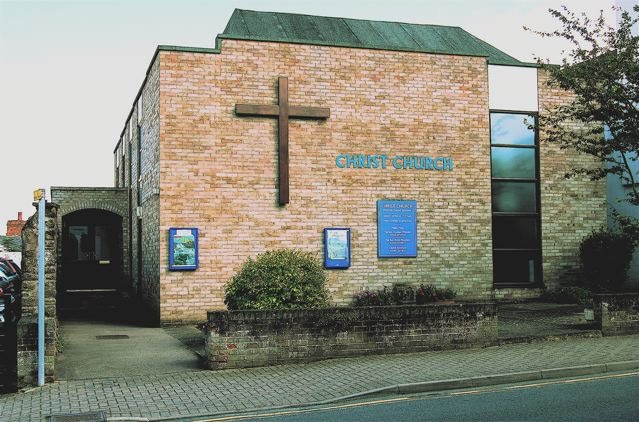
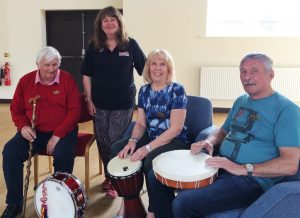

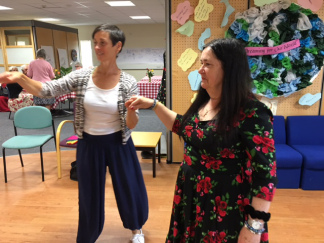
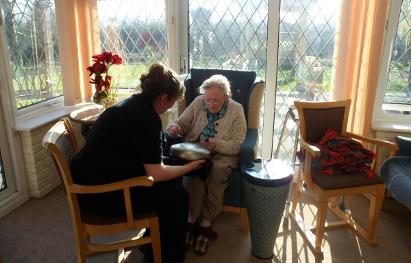
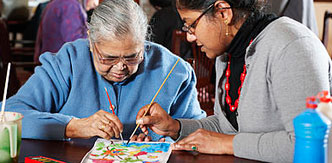
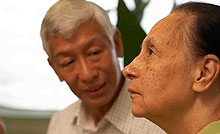
10 A volunteer and focused caree
from an Alzheimer's Society webpage
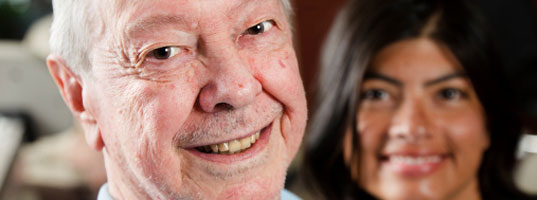
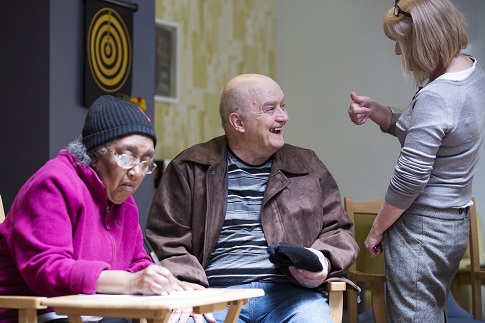
12 Volunteer with carer and caree
from an Alzheimer's Care & Cure mag
13 We all wear our name badges at the Leominster DMC . . . .
14 . . . . and carefully put them in the right compartment before we go home.
This carer's minor DIY project but keep it quiet.
15
"The cheese" as it's called at the Leominster DMC is 4ft on each side. Members of two teams throw three mice at a time.
An expensive Leominster DMC item prone to puncture. Shed talk will come up with plastic tubs screwed to a piece of wood.
